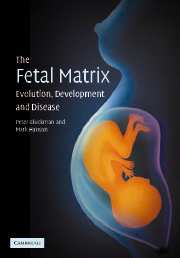Book contents
- Frontmatter
- Contents
- Preface
- 1 Shaping our destiny: genes, environment and their interactions
- 2 Mother and fetus
- 3 Fetal choices
- 4 Predictive adaptive responses and human disease
- 5 Obesity, diabetes and other diseases
- 6 The biology of predictive adaptive responses
- 7 Predictive adaptive responses – critical processes in evolution
- 8 Evolutionary echoes and the human camel
- 9 Improving human health
- 10 Fetal futures
- Further reading and references
- Index
9 - Improving human health
Published online by Cambridge University Press: 05 November 2011
- Frontmatter
- Contents
- Preface
- 1 Shaping our destiny: genes, environment and their interactions
- 2 Mother and fetus
- 3 Fetal choices
- 4 Predictive adaptive responses and human disease
- 5 Obesity, diabetes and other diseases
- 6 The biology of predictive adaptive responses
- 7 Predictive adaptive responses – critical processes in evolution
- 8 Evolutionary echoes and the human camel
- 9 Improving human health
- 10 Fetal futures
- Further reading and references
- Index
Summary
Disease, evolution and ageing
Since the evolution of Homo sapiens, some 150000 years ago humans have made enormous strides in the battle for survival through the use of shelter, clothing, fire and weaponry and, since civilisations developed, through the development of social structures, religion, medication and healthcare. These strategies, which started to appear with the discovery of tool making, the control of fire and the development of culture, meant that humans have been able to sustain a very broad variety of phenotypes (and hence genotypes) across a range of environments. It is sometimes said that the control humans have over their environment means that we have stopped or, at least slowed, our evolution.
In evolving, humans traded-off reproductive performance for longevity. Contrast humans to rodents. Rodents invest their resources in getting large numbers of individuals to reproductive age as quickly in the life cycle as possible, but invest very little in promoting survival beyond that period. Humans have evolved the opposite strategy – later attainment of reproductive competence, a smaller investment in the number of offspring, and a considerable investment in preservation of members of the species beyond the reproductive period. Such older members assist with the child care associated with our slower development and ensure the passage of complex cultural traditions to these offspring.
But evolution primarily selects for advantage up to and during the reproductive period of life.
- Type
- Chapter
- Information
- The Fetal Matrix: Evolution, Development and Disease , pp. 190 - 205Publisher: Cambridge University PressPrint publication year: 2004



